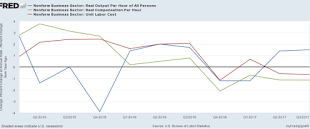A look at employment compensation in Russia.Fort RussStudy: Highest salaries in Russia are not in Moscow SVPressa - translated by Inessa Sinchougovasee alsoRussian finance minister: Our deficit will not surpass 2% of the 2017 GDP Paul Antonopoulos
Read More »Pepe Escobar — The New Great Game moves from Asia-Pacific to Indo-Pacific
In the context of the New Great Game in Eurasia, the New Silk Roads, known as the Belt and Road Initiative (BRI), integrates all of China’s instruments of national power – political, economic, diplomatic, financial, intellectual and cultural – to shape the 21stcentury geopolitical/geoeconomic order. BRI is the organizing concept of China’s foreign policy for the foreseeable future; the heart of what was conceptualized, even before President Xi Jinping, as China’s “peaceful rise.” The Trump...
Read More »Richard Turnill — What a Flattening U.S. Yield Curve Means
The flatter yield curve is not a recessionary signal, so what is it telling us? Much of this year’s earlier yield curve flattening represented a reversal of the 2016 steepening that accompanied surging economic growth and inflation expectations after the U.S. presidential election. Markets had bet that fiscal stimulus and infrastructure spending would spur growth and inflation. Long-term yields jumped in response. Those market expectations unwound over the course of 2017 when policy changes...
Read More »Bank Underground — A prince not a pauper: the truth behind the UK’s current account deficit
Bank of England — Bank UndergroundA prince not a pauper: the truth behind the UK’s current account deficit Rachana Shanbhogue, Macroprudential Strategy and Support Division, and Stephen Burgess, Macrofinancial Risks Division
Read More »Brad DeLong — America’s Broken System
The tax-reform bill that US Republicans are attempting to implement is economically indefensible and blatantly unfair. But the US has a much deeper problem: the Anglo-Saxon model of representative government is in serious trouble, and nobody seems to know how to fix it. Project SyndicateAmerica’s Broken SystemBrad DeLong | Professor of Economics, UCAL Berkeley
Read More »The Arthurian — Say’s Law and Say’s Other Law
Say understood that supply and demand are reciprocal and mutually reinforcing. The New Arthurian EconomicsSay's Law and Say's Other LawThe Arthurian
Read More »Alex Hughes — Economists in 2017: What Can They Agree On?
MMT is mentioned, but the author buys into the criticism of MMT based on assuming central bank and Treasury consolidation, and he misses the key concept of Treasury issuance being a reserve drain in his criticism. He mentions Stephanie Kelton and gives a shout out to Scott Fullwiler, too. The post is also interesting as a look at popularized economics. Hughes cites an Izabella Kaminska post at FT Alphaville on MMT that is worth reading or re-reading as the case may be: Why MMT is like...
Read More »Bank-Relief Bill winding thru Congress
Looks like this thing is progressing thru the sausage grinder; has even picked up some Democrat support. Looks like at least reserve balances ($2.5T system wide) will be removed from capital requirements; from the summary: Section 402. Supplementary Leverage Ratio for Custodial Banks. This section requires the Federal banking agencies to amend the supplementary leverage ratio final rule (SLR) to specify that funds of a custodial bank that are deposited with a central bank will not be...
Read More »Paul Craig Roberts – Walking into Armageddon
Chilling stuff! The orchestrated hostility toward Russia, China, Iran, and North Korea protects the $1,000 billion annual budget of the military/security complex by convincing the American public that the US is threatened by enemies. It also keeps alive Democratic Party hopes that Trump can be removed from office, and it has prevented President Trump from normalizing relations with Russia. I have emphasized for some time that Washington’s gratuitous and aggressive actions against Russia...
Read More »David F. Ruccio – Whose recovery?
If you read the business press in the United States (e.g., the Wall Street Journal), you’ll find something along the lines of the following argument: the fact that U.S. worker productivity rebounded in the third quarter while hourly wages rose moderately is a sign “the economy is strengthening.” But look at the numbers. Nonfarm business sector productivity (the blue line in the chart above) rose 1.5 percent (from the same quarter a year ago) while real hourly compensation (the green line)...
Read More » Mike Norman Economics
Mike Norman Economics

